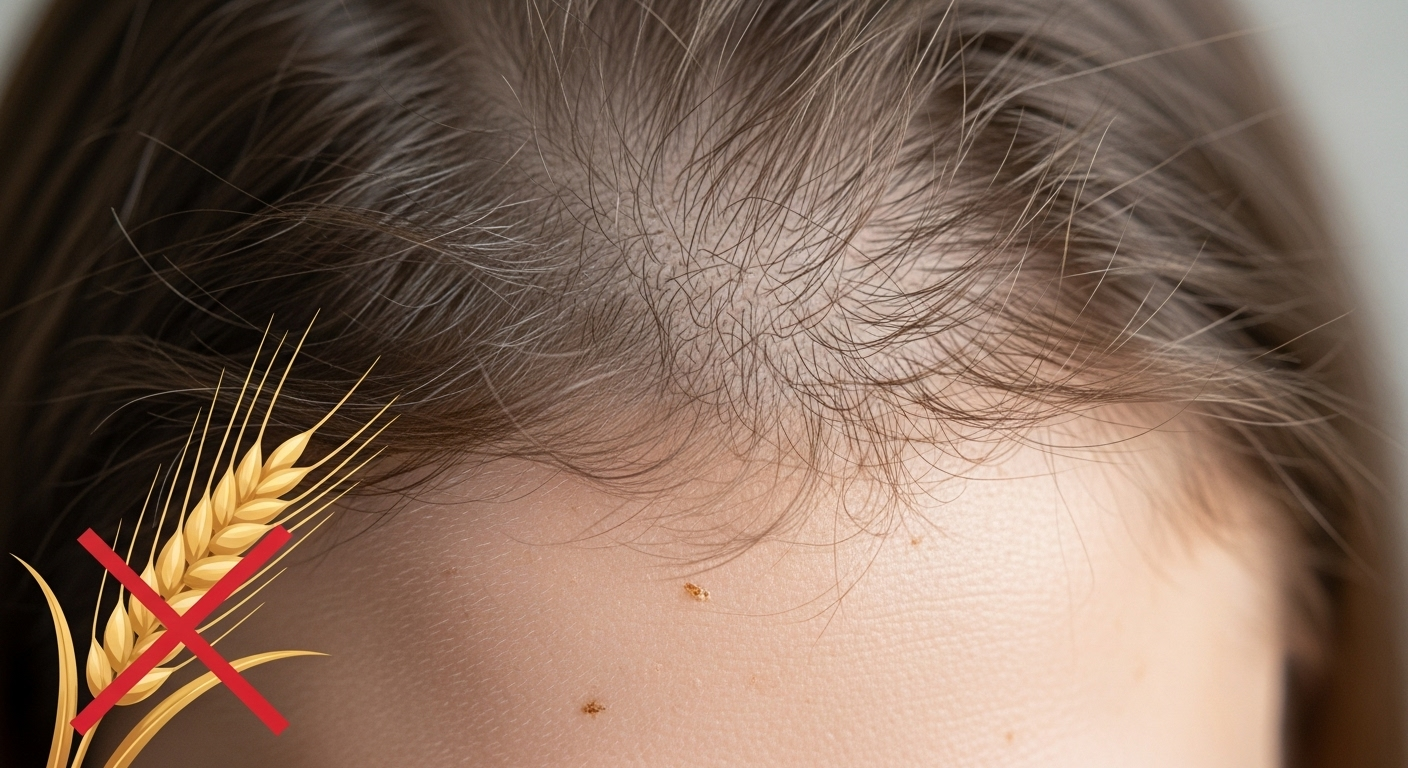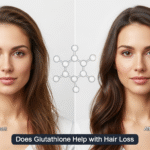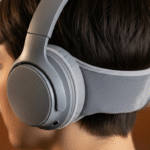Hair loss with celiac disease is a concern many people with this autoimmune condition face. It’s a frustrating problem that can stem from various factors like nutrient deficiencies, immune system reactions, and stress. This article explores the connection between celiac disease and hair loss, offering scientific explanations, treatment options, and expert advice on managing hair …
Hair loss with celiac disease is a concern many people with this autoimmune condition face. It’s a frustrating problem that can stem from various factors like nutrient deficiencies, immune system reactions, and stress.
This article explores the connection between celiac disease and hair loss, offering scientific explanations, treatment options, and expert advice on managing hair health.

What is Celiac Disease?
Overview of Celiac Disease
Celiac disease is an autoimmune disorder that affects the small intestine. When someone with celiac disease consumes gluten (a protein found in wheat, barley, and rye), their immune system mistakenly attacks the lining of the small intestine, causing inflammation and damage.
This inflammation impairs nutrient absorption, leading to various symptoms, including digestive problems, fatigue, and malnutrition.
Common Symptoms and Effects of Celiac Disease
Besides digestive issues, people with celiac disease often experience symptoms such as:
- Fatigue
- Bloating
- Weight loss
- Joint pain
- Skin rashes
Over time, if left untreated, celiac disease can lead to severe malabsorption of nutrients, which can directly impact the health of your hair.
How Does Celiac Disease Cause Hair Loss?
Nutrient Deficiencies and Their Impact on Hair Health
One of the most significant ways celiac disease leads to hair loss is through nutrient deficiencies. When the intestines are damaged, they cannot absorb vital nutrients, including iron, zinc, biotin, and vitamins like A and D, all of which are crucial for maintaining healthy hair. A deficiency in these nutrients can lead to weakened hair follicles and thinning hair.
- Iron Deficiency: Often seen in individuals with celiac disease, iron deficiency can contribute to hair thinning and shedding.
- Zinc Deficiency: Zinc is essential for hair growth, and its deficiency can cause hair loss.
- Biotin Deficiency: Biotin helps maintain hair health, and its deficiency may cause brittle hair and thinning.
Immune System Reaction and Its Effect on Hair Follicles
Celiac disease causes chronic inflammation due to the immune system attacking the intestine. This ongoing inflammation can affect the hair growth cycle, pushing hair follicles into the shedding phase prematurely. This type of hair loss is called telogen effluvium, which is typically temporary but can result in noticeable thinning.
The Role of Stress in Hair Loss with Celiac Disease
Celiac disease itself can be a significant stressor on the body, which, in turn, may trigger hair loss. Stress is another known factor that contributes to telogen effluvium, making those with celiac disease more susceptible to hair thinning during flare-ups or when gluten is inadvertently consumed.
Managing Hair Loss with Celiac Disease

Diet and Nutritional Interventions
The most effective treatment for celiac disease is a gluten-free diet. By eliminating gluten from your meals, you reduce inflammation and allow your small intestine to heal. This healing can help restore nutrient absorption, which may, in turn, improve hair health.
- Gluten-Free Foods for Hair Health: Include leafy greens, nuts, seeds, fatty fish, and eggs to boost nutrient intake.
- Supplementation: If deficiencies persist, consider supplements for iron, zinc, and biotin, all of which support hair growth.
A balanced gluten-free diet not only supports hair health but also prevents further damage to the intestines, addressing the root cause of nutrient deficiencies.
Medical Treatments for Hair Loss
For those with celiac-related hair loss, topical treatments like minoxidil can be beneficial in stimulating hair growth. Minoxidil is FDA-approved and has been shown to promote hair regrowth in cases of hair thinning. However, it is essential to first address the underlying cause of hair loss—namely, celiac disease and nutrient deficiencies—before relying on topical treatments.
Always consult a healthcare provider before starting treatments for hair loss, especially if you’re managing an autoimmune condition like celiac disease.
Lifestyle Modifications for Hair Health
Managing stress is another critical aspect of managing hair loss. Celiac disease can be stressful, particularly when dealing with flare-ups or gluten exposure. Practice stress-reduction techniques like:
- Yoga
- Meditation
- Breathing exercises
These practices can help reduce inflammation, improve overall well-being, and promote healthier hair growth.
Additionally, proper hair care is vital. Use gentle, sulfate-free shampoos, avoid tight hairstyles that strain the hair follicles, and limit heat styling to reduce hair breakage.
Expert Opinions on Hair Loss and Celiac Disease
Case Studies of Individuals with Celiac Disease and Hair Loss
Several individuals with celiac disease have shared their journeys of hair restoration after adopting a gluten-free diet. One such case involved a 34-year-old woman who experienced significant hair thinning due to nutrient deficiencies. After six months on a gluten-free diet and supplementing with iron and zinc, she reported a noticeable improvement in both hair density and quality.
These case studies highlight the importance of treating celiac disease and addressing nutrient deficiencies to achieve better hair health outcomes.
FAQs
Is Hair Loss a Common Symptom of Celiac Disease?
Yes, hair loss can be a common symptom of celiac disease, primarily due to nutrient deficiencies and stress. Many individuals experience thinning hair, especially during flare-ups or after gluten exposure.
How Long Does It Take to Regrow Hair After Starting a Gluten-Free Diet?
It can take anywhere from 3 to 6 months for individuals to see improvements in hair health after starting a gluten-free diet. Nutrient absorption improves as the small intestine heals, and hair growth can resume in a healthier environment.
Can Hair Loss from Celiac Disease Be Prevented?
While you cannot prevent hair loss from celiac disease entirely, following a strict gluten-free diet, managing nutrient deficiencies, and reducing stress can significantly reduce the likelihood of hair loss and promote hair regrowth.
Are There Any Natural Remedies for Hair Loss in Celiac Disease Patients?
Natural remedies like using coconut oil or rosemary oil on the scalp may help promote circulation, but addressing nutrient deficiencies through diet and supplements remains the most effective approach for managing hair loss.
Conclusion: Protecting Your Hair Health with Celiac Disease
Managing hair loss with celiac disease requires a comprehensive approach that includes a gluten-free diet, addressing nutrient deficiencies, and managing stress. By following these steps, many individuals with celiac disease can successfully regain healthy hair. It’s crucial to consult with a healthcare provider or dermatologist to create a tailored plan to restore your hair health.
Ready To Take Your Next step
Struggling with hair loss due to celiac disease? Book a consultation with Dr. Uzma Irfan, an ISHRS-certified surgeon in Islamabad today to create a customized treatment plan and get your hair back on track!






